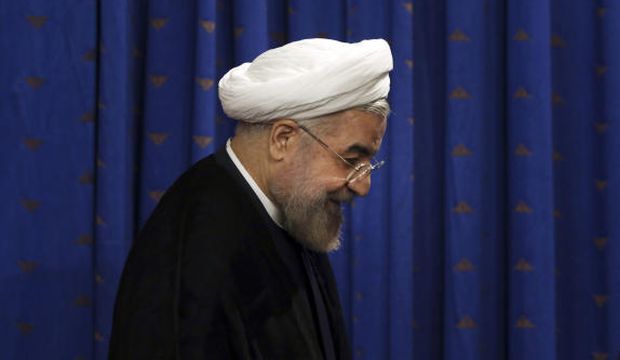
Iranian President Hassan Rouhani leaves after conducting a press conference in Tehran, Iran, on Saturday, June 14, 2014. (AP Photo/Vahid Salemi)
London, Asharq Al-Awsat—Iranian President Hassan Rouhani has sent his younger brother, Hossein Fereydoun, to the latest round of international talks in Vienna over Iran’s nuclear program as the deadline for a final settlement approaches.
Fereydoun, who is also one of Rouhani’s key aides, is attending the talks for the first time, leading analysts and journalists to conclude that Rouhani is determined to reach an agreement by the July 20 deadline agreed by both sides.
Fereydoun Majlesi, a former Iranian diplomat, told Asharq Al-Awsat that his presence was an indication of how seriously Rouhani was taking the deadline.
Majlesi noted that Fereydoun had recently acted as Rouhani’s envoy to Chinese leaders to convey his stance on the nuclear talks, and said that Fereydoun “is well informed and has a mandate on this matter.”
In the Iranian media, Fereydoun’s presence at the talks has also been portrayed as a sign of Rouhani’s desire to reach a deal as the talks enter a key phase.
On Monday, Iran’s Fars news agency quoted a member of the Iranian delegation, who said: “Due to [the] intense work schedule of [Foreign Minister Mohammad Javad] Zarif, he is not able to travel back to Tehran to consult with the president, therefore the president’s brother has been sent to Vienna to report the content of negotiations directly to the president in a secure way.”
US Secretary of State John Kerry arrived in Vienna to join the talks on Sunday, and held two rounds of talks with Zarif on Monday, in a bid to move the process forwards.
Iran and the P5+1 (the five permanent members of the UN Security Council, plus Germany) reportedly remain at odds over Iran’s desire to develop the capability to enrich uranium on a large scale, among other issues.
While uranium enrichment is necessary to produce reactor fuel, it can also be used to produce the core of a nuclear weapon.
Tehran insists that its program is entirely peaceful, and that it requires facilities to enrich fuel for a network of reactors it plans to construct.
However, despite the focus on the nuclear talks, a source in Tehran—speaking on condition of anonymity—told Asharq Al-Awsat that Fereydoun’s role in Vienna is to assist in talks with western officials on issues which Zarif has not been authorized to discuss, including the situation in Iraq, Syria, and Iran’s links with Hezbollah.
“Fereydoun’s presence allows a ‘Track 2’ channel of conversation over all important issues between Iran and the West to be discussed, and possibly middle-ground solutions can be worked out,” the source said.
“[He] was also the main broker in arranging the unprecedented phone conversation between [Rouhani] and [Obama] back in September 2013,” the source added.
Fereydoun was appointed Rouhani’s special aide for executive affairs on August 28, 2013, shortly after Rouhani assumed office. Although he is not unknown to the Iranian media, he has kept a low profile over the last three decades as his brother became an increasingly prominent public figure, assisted by the fact that he did not change his surname to Rouhani unlike his older sibling.
Fereydoun is said to have been a member of Ayatollah Khomeini’s cadre of bodyguards from the outset of the 1979 revolution, and then became governor of the counties of Nishapur and then Karaj, in northeastern and central Iran. He is also said to have been part of Iran’s covert attempts to evade an international arms embargo during the Iran–Iraq War in the 1980s.
After the war, Fereydoun spent eight years as Iran’s ambassador to Malaysia, and then several years in Iran’s delegation to the UN. After returning to Iran, he was appointed to a post at the Center for Strategic Research, and worked as an advisor to his brother during his time as secretary of Iran’s influential Supreme Council for National Security.
Fereydoun’s first high-profile appearance occurred during Rouhani’s first trip to the UN while president. He was present at the first direct meeting between Foreign Minister Zarif and US secretary of State Kerry in September 2013.
